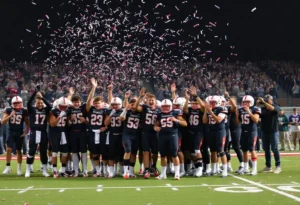Nashville Meeting Highlights Power Dynamics in College Football
NASHVILLE, Tenn. — The leaders of college football’s two biggest conferences made their position clear during a significant meeting in Nashville this week: they are not interested in sharing control with outside investors or private equity groups. Big Ten commissioner Tony Petitti and SEC commissioner Greg Sankey held a six-hour discussion to address several pressing issues concerning the future of college sports.
This gathering follows a rise in attention toward potential super league concepts driven by groups like “Project Rudy.” In response, Sankey noted, “It’s no coincidence they ramped up their public relations schemes around our meeting.” Petitti echoed these sentiments, arguing that the proposals pitched by these private entities lack unique or innovative ideas, emphasizing that college leaders can manage college football on their own.
According to Petitti, “The notion that college football is broken is just not right,” pointing out the immense interest in their games, particularly in the Big Ten and SEC. While acknowledging that there’s always room for improvement, he firmly stated that it’s the responsibility of the college leaders to enhance the experience for fans and players.
During the meeting, the conference officials discussed a variety of topics, including the upcoming College Football Playoff (CFP), the recent $2.8 billion settlement related to the House vs. NCAA lawsuit, and future scheduling arrangements between the two conferences. With both Petitti and Sankey nurturing a collaborative relationship since Petitti took over in May 2023, both parties aim to secure a more favorable revenue split from the CFP.
Starting in 2026, the combined revenue payout for the Big Ten and SEC from the CFP is expected to exceed 50%. The conversation also touched upon how the selection process for future CFP formats will evolve as well. While both leaders were cautious about future changes, they emphasized a desire to see how the new 12-team playoff plays out first.
Additionally, Sankey called for significant changes to the NCAA governance model, criticizing its slow response to the evolving landscape of college athletics. He stressed that the current structure of the NCAA Division 1 Council is ineffective for the sport’s rapid changes, suggesting it needs to adapt quickly or risk losing its relevance.
If the NCAA cannot evolve, it appears both the Big Ten and SEC are prepared to take action on their own to ensure the future of college football remains bright.
Author: STAFF HERE ROCK HILL
The ROCK HILL STAFF WRITER represents the experienced team at HERERockHill.com, your go-to source for actionable local news and information in Rock Hill, York County, and beyond. Specializing in "news you can use," we cover essential topics like product reviews for personal and business needs, local business directories, politics, real estate trends, neighborhood insights, and state news affecting the area—with deep expertise drawn from years of dedicated reporting and strong community input, including local press releases and business updates. We deliver top reporting on high-value events such as the Come-See-Me Festival, Rock Hill Arts Festival, and motorsport events at the Rock Hill Velodrome. Our coverage extends to key organizations like the Rock Hill Chamber of Commerce and the Culture & Heritage Museums, plus leading businesses in manufacturing and technology that power the local economy such as 3D Systems and Comporium. As part of the broader HERE network, including HEREAiken.com, HEREBeaufort.com, HEREChapin.com, HERECharleston.com, HEREClinton.com, HEREColumbia.com, HEREGeorgetown.com, HEREGreenwood.com, HEREGreenville.com, HEREHiltonHead.com, HEREIrmo.com, HEREMyrtleBeach.com, HERENewberry.com, HERERockHill.com, and HERESpartanburg.com, we provide comprehensive, credible insights into South Carolina's dynamic landscape.








